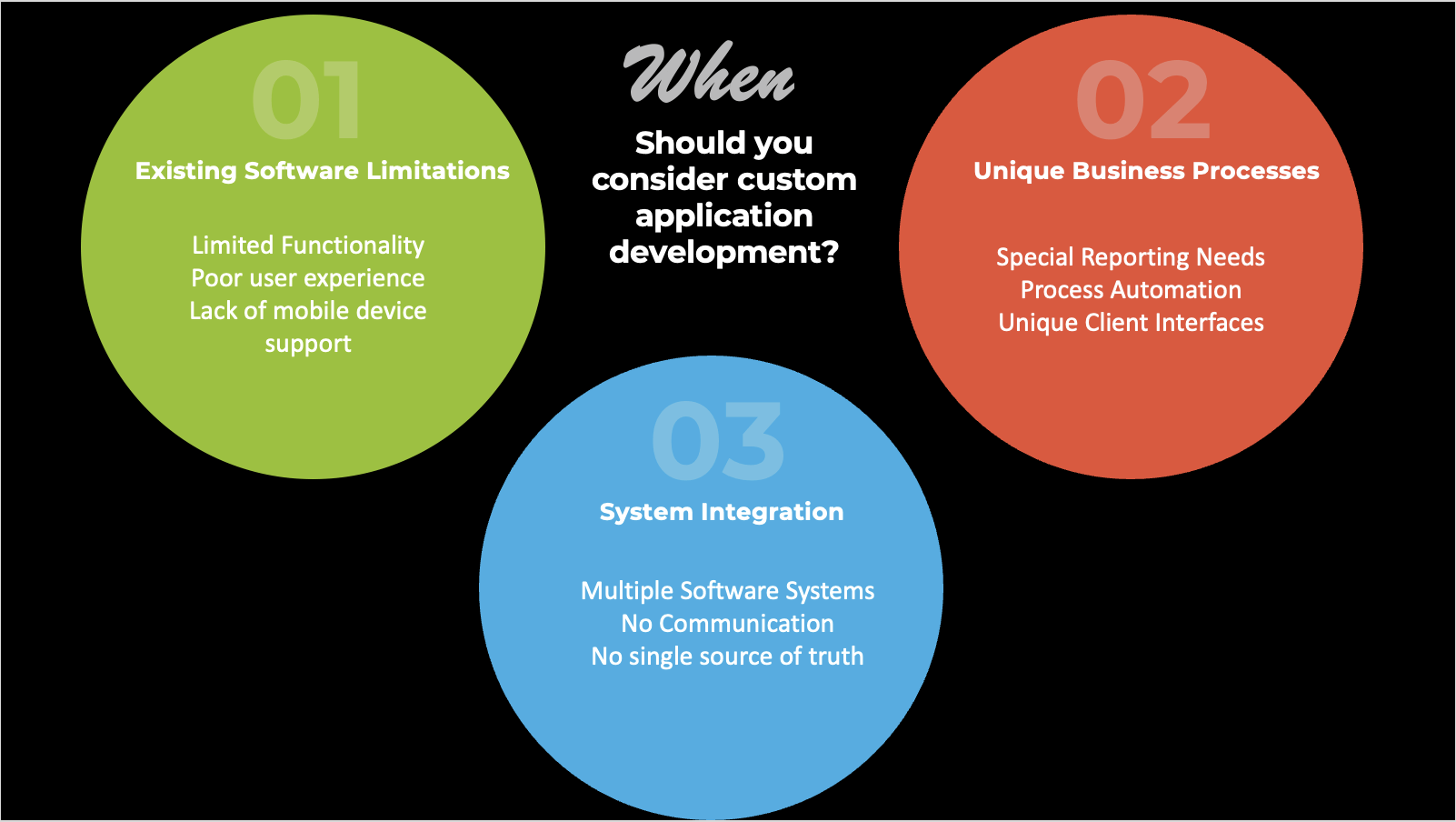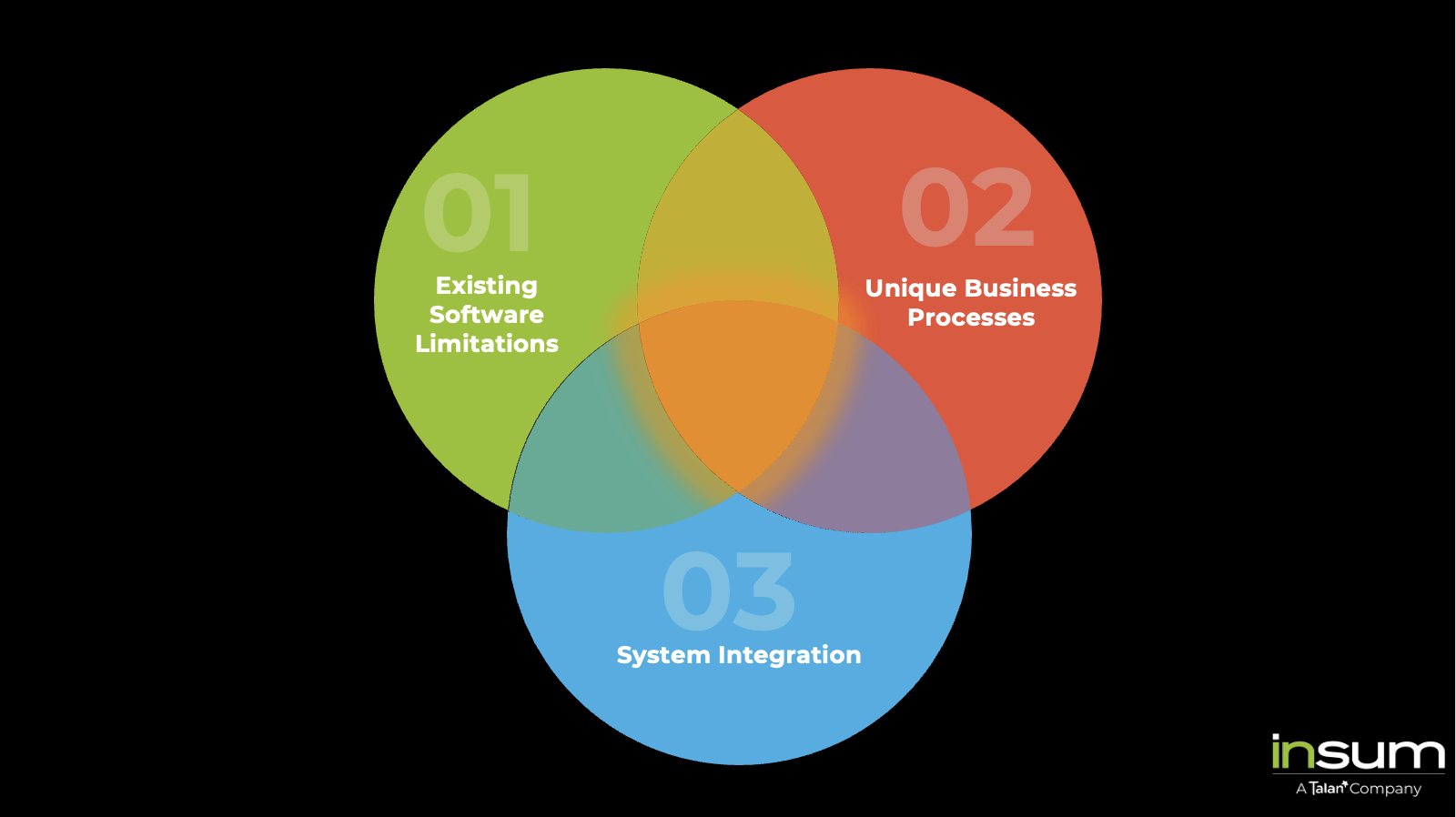Ever found yourself at the crossroads of choosing between custom software and Commercial Off-The-Shelf (COTS) solutions? I know, it’s like standing at a buffet wondering whether to go for the familiar pizza or try that intriguing, exotic dish you can’t pronounce.
In my own experience, I’ve seen all types. There are the DIY enthusiasts, ready to build everything from scratch – even if it’s just a simple lemonade stand, they’d rather chop down a tree and start hammering. Then there are those who wouldn’t touch a hammer if their life depended on it; they’d rather buy a pre-built stand, even if it’s a tad too big or the color isn’t quite right.
But what about the rest of us? Those who aren’t firmly in either camp but rather, right in the middle, looking for a bit of guidance? Well, you’re not alone. The decision isn’t always black and white.
This post is for those of you in the gray area, looking for a little clarity. We’re going to explore some clear-cut scenarios where custom software development doesn’t just make sense – it absolutely shines.
Understanding COTS Software
What Exactly is Commercial Off-The-Shelf (COTS) Software?
Let’s start with the basics. Imagine walking into a store and picking up a software package right off the shelf – that’s essentially what Commercial Off-The-Shelf (COTS) software is. It’s pre-made, packaged, and ready for use by a wide audience. COTS software is designed to meet the general needs of many users, not tailored to the unique requirements of any single user or business.
The Bright Side of COTS
Why do people gravitate towards COTS? Well, there are a few pretty good reasons:
- Cost-Effective: Often, COTS solutions are more budget-friendly upfront.
- Quick to Deploy: With COTS, you’re essentially plugging and playing. There’s no waiting around for developers to build something from scratch.
- Tried and Tested: Since COTS software is used widely, it’s generally reliable and stable. Think of it as the classic recipe that’s been around for ages – it might not be gourmet, but it’s dependable and gets the job done.
The Not-So-Great Bits
However, COTS isn’t a one-size-fits-all solution. Here are some areas where it might fall short:
- Lack of Customization: Imagine trying to fit into someone else’s tailored suit. COTS software can be like that – it’s not designed specifically for your business’s unique needs.
- Scalability Issues: As your business grows, that COTS software might not grow with you. A bit like trying to fit your whole family into a two-seater car (that car that seemed like such a good idea when you hit 50, you know who you are…)
- Integration Difficulties: Sometimes, COTS software doesn’t play nice with your existing systems. Like trying to do a jigsaw puzzle, but the pieces are from different sets.
- Overkill for your needs: There are some occasions when COTS software just has too many bells, whistles and features that you and your users are overwhelmed. This was the case for our client, a pharmaceutical provider, that had originally gone with a COTS solution but decided to replace it with a simpler, better suited custom application (see right).
Understanding Custom Software/Application Development
What is Custom Software Development?
Now, let’s switch gears and talk about custom software development. Picture a tailor taking your measurements and crafting a suit that fits you perfectly. Custom software is the digital equivalent of that tailor-made suit. It’s software specifically designed and developed to meet the unique requirements of an individual business or user. No off-the-shelf solutions here – it’s all about creating something that’s as unique as your business fingerprint.
The Bright Side of Custom Software
Custom software comes with a bouquet of benefits that can be pretty attractive:
- Tailored to Fit: Just like that tailor-made suit, custom software is designed to fit your business’s specific needs like a glove. It’s crafted to support your unique processes, workflows, and business objectives.
- Scalable and Flexible: As your business evolves, your custom software can grow and adapt with you. It’s like having clothes that magically adjust to your size over the years.
- Seamless Integration: Custom software can be developed to integrate smoothly with your existing systems, creating a unified IT environment. It’s like a puzzle where every piece fits perfectly.
The Challenges of Custom Software
However, custom software isn’t without its challenges:
- Higher Initial Cost: Developing software tailored to your specific needs can be more expensive upfront. It’s an investment, like commissioning a piece of art rather than buying a print.
- Longer Development Time: Unlike picking something off the shelf, custom software takes time to develop. It’s a journey from conception to final product, not an instant grab-and-go.
- Requires Expertise: To ensure you get what you need, it’s crucial to partner with a skilled development team. It’s like needing an experienced chef to cook a gourmet meal.
The tell-tale signs Custom Software might be right
Ok, so clearly custom applications or solutions aren’t a walk in the park, even with a low-code development platform such as Oracle APEX. So, when should you consider crafting your very own digital masterpiece? Let’s break it down into three scenarios where going custom should definitely be considered.
1. Existing Software Limitations: The Square Peg, Round Hole Dilemma
Ever tried using a software that fits your business needs about as well as a square peg fits into a round hole? You’re not alone. From limited functionality that leaves you wanting more, to a user experience that makes you wonder if it was designed as a practical joke, these are telltale signs that it’s time to go bespoke.
And let’s not forget about mobile device support. In a world where we’re all glued to our phones (no judgement here, I’m guilty too), if your software isn’t mobile-friendly, you might as well be using carrier pigeons.
2. Unique Business Processes: Because “One Size Fits All” Is a Myth
Your business is as unique as your favorite coffee order (extra shot, oat milk, dash of cinnamon, anyone?). Standard software might cover the basics, but what about your special reporting needs, process automation, or those unique client interfaces that make your service stand out? When off-the-shelf solutions treat your espresso-shot business like it’s just another cup of instant coffee, it’s time to consider a custom blend.
3. System Integration: The Symphony of Synergy
Here’s where it gets tricky. If your business is juggling multiple systems that barely talk to each other, you’ve got a recipe for chaos. Think of it like an orchestra where every musician is playing a different song. Not exactly music to your ears, right?
Data silos and lack of a single source of truth can turn your business into a wild goose chase for information. Custom development can be the conductor that brings harmony to your data symphony.
3 scenarios for custom software

The sweet spot: where they intersect

Bringing It All Together: Making a Thoughtful Choice
The decision to go for custom software isn’t one to be made on a whim. It’s not like choosing between vanilla and chocolate ice cream; it’s more akin to deciding whether to buy a car or build one from scratch. And ask our colleague Rich Soule, that’s no easy feat! Sure, building your car could give you everything you’ve ever wanted on four wheels, but it’s a significant undertaking, not to mention the expertise and time required.
The Decision-Making Crossroads
Imagine each scenario on its own as an individual signpost. While having all these signs point in the same direction makes the path to custom software clear, sometimes even a single signpost can be compelling enough to take this route.
But if you find yourself at a crossroads where multiple scenarios we’ve discussed align – unique business processes, the need for seamless integration, scalability concerns – then the decision tilts clearly in favor of custom software. It’s like having multiple signs pointing towards a destination; you just know it’s where you need to go.
What You Gain with Custom Software
Remember, with custom software, you’re not just getting a tool; you’re investing in a solution sculpted to your exact requirements. Here’s what you stand to gain:
- Precision Alignment with Your Business Needs: Custom software is like a suit tailored to your measurements – it fits your business perfectly, supporting and enhancing your unique processes and workflows.
- Long-Term Scalability: As your business grows and evolves, your software grows with you. It’s a long-term partner, not just a short-term solution.
- Competitive Advantage: Custom software can provide functionalities that set you apart from competitors who use standard solutions. It’s a secret weapon tailored to your strategic goals.
- Efficiency and Productivity: With software designed specifically for your needs, your team can work more efficiently, reducing time spent on workarounds or battling with incompatible tools.
Proceed with Insight and Expertise
Diving into custom software development requires insight and expertise. It’s essential to partner with a development team that understands your vision and can bring it to life. The right partner can make the journey from concept to reality smoother and more successful.
Final Thoughts
The truth is that custom software development is not a path to be taken lightly, but in the right circumstances, it can be a game changer for your business. It’s about making an informed, strategic decision that aligns with your specific needs and goals. If you find yourself facing the scenarios we’ve outlined, the benefits of custom software development are not just apparent – they’re compelling.
But it’s important to emphasize that the choice to develop custom software is just the start of a strategic journey. The key to success lies in choosing the right partner, and Insum, a Talan company, stands out in this regard. With our 20 years of expertise as leaders in Oracle APEX development, we’re perfectly equipped to guide you through the intricacies of custom software development.
At Insum, we don’t just develop solutions; we understand and integrate your unique business needs into powerful, scalable digital tools. Our proficiency in Oracle’s low code development platform ensures a seamless, efficient process, tailored to your business objectives. Let us be your guide and ally on this transformative journey, helping you to harness the full potential of custom software. Together, we’ll turn your vision into a reality that not only serves your immediate needs but also paves the way for future growth and innovation.










